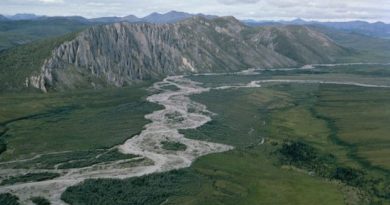Warming Arctic could be at heart of deadly July heatwave

It’s been a hot July.
Wildfires in Greece killed at least 83, Sweden is desperately fighting fires above the Arctic circle, heat waves have struck everywhere from the U.K. to Siberia, and at least 70 deaths in Quebec (eastern Canadian province) in July were linked to the heat.
If we want to understand what’s driving this heat wave — and if we should expect more of the same — we need to look northward, according to Dr. Jennifer Francis, research professor in Marine and Coastal Sciences at Rutgers University.
Francis has been studying Arctic climate her entire career, and has authored and co-authored dozens of articles in peer-reviewed publications on the subject since the 1990s.
“The basic story is that because the Arctic is warming so much faster than everywhere else, it’s having an effect on mid-latitude weather,” she told CBC.
Weakening jet stream
According to Francis, weather patterns can stall in certain areas — prolonging an intense heat wave, for example — if the jet stream gets too weak.
She describes the jet stream as a fast-moving current of air flowing across the northern hemisphere, passing over mid and northern Canada. It’s caused by the collisions between frigid, descending air moving southward from the Arctic, and rising warm air coming from the equator.
“The temperature difference between the Arctic and areas farther south is what drives the winds of the jet stream,” Francis said.
That jet stream, she said, helps create weather patterns.
“When the jet stream encounters a mountain range, for example, when the winds are strong, it doesn’t really care,” she said.
“It blows right by just like a strong river of water will tend to go right over a boulder in the stream. But when the winds are weak, it’s more easily deflected from its path.”
“This creates weather patterns on the surface that tend to also get stuck in one place for a long time.”
Given that the Arctic is warming at least twice as fast as anywhere else in the world, Francis says the temperature difference between Arctic and equatorial winds becomes smaller and smaller.
This is “weakening the winds of the jet stream,” she said.
“This creates weather patterns on the surface that tend to also get stuck in one place for a long time.”
See NASA video representation of the polar jet stream (video from 2011):
Francis says while this research isn’t conclusive yet, the science is “pretty well-settled.”
“We can’t finger point directly at the Arctic to say that this summer’s crazy weather is directly related to the rapid warming up there, but it certainly fits the story that we’ve been putting together over the last several years.”
Northwestern Canadian example
Environment Canada issued a heat warning for Yukon earlier this week. The territory is expecting the hottest temperatures it’s seen since July 2013.
CBC meteorologist Ashley Brauweiler said that in May this year the jet stream became blocked up, and the heat wave is a direct result of that stalled jet stream.
“The ridge is sitting over the Yukon, funnelling in the warmer southern air. This pattern doesn’t move for the next couple of weeks,” she said.
“That means you’re going to have to get used to this heat across the Yukon.”
With files from Walter Strong
Related stories from around the North:
Canada: Warming Arctic shrinking Canadian glaciers at alarming rate says study, Eye on the Arctic
Finland: Crews contain fresh wildfires in western Finland, Yle News
Norway: European Arctic swelters under tropical temperatures, breaks heat records, The Independent Barents Observer
Russia: Forest fires are raging across the Barents region, The Independent Barents Observer
Sweden: Forest fires will become more frequent as climate warms, says scientist, Radio Sweden
United States: Alaska’s firefighters are ready for wildfire season, Alaska Public Media




The article is based on data that is no longer relevant (2011) The Climate is changing faster than the time it takes for a research project to be proposed, funded, completed, studied, published, and peer-reviewed.
Currently, Icebreakers for the 1st time in many years are working in the Arctic & Hudson’s Bay to keep a path open to ports so that merchant ships can deliver. This is evidence that Arctic Sea Ice is actually getting thicker rather than melting.
Global Warming stopped 10 years ago. We are now in a Cooling Cycle. Unfortunately, it will be years before the Main Stream Media reports on it, if at all.
How can you ignore that we are in Biosphere collapse? All you have to do is look around. Geoengineering is doing more harm than good, it’s like putting a band-aid on the symptom. The side-effects are devastating.